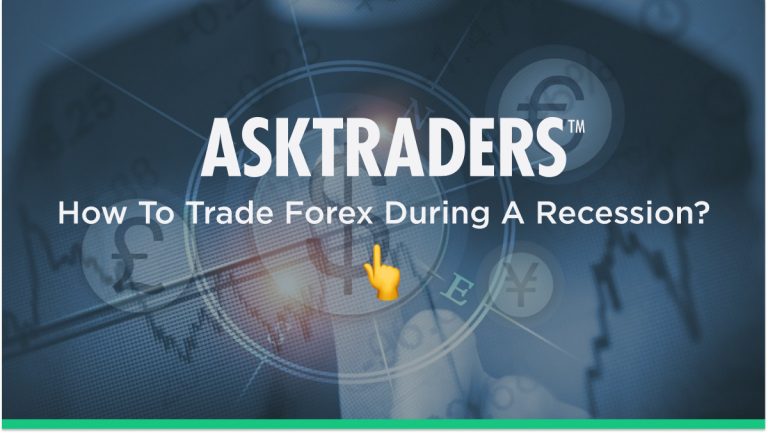
If you already have positions in the market, you may look to protect them during a recession. If you’re approaching the market fresh, then it’s a case of spotting the best forex trading opportunities. These might involve buy-and-hold style strategies or day trading of forex.
No one wants to see a recession form, but forex traders who prepare for an economic slowdown can turn underlying changes in a country’s economy into trading opportunities. The below breakdown of how to trade forex during a recession discusses the ways to exploit the turmoil associated with economic slowdowns.
What Is A Recession?
A recession is defined as a period of reduced economic and industrial activity in which an economy’s gross domestic product (GDP) contracts for two consecutive quarters. That GDP number is made up of data provided by the manufacturing and service sectors of the economy. It can be that both fall in value or one does to such an extent that it drags the total number down to a negative reading.
Other data points can give an indication of the fortunes of an economy and add more ‘colour’ so that traders can try to take profitable positions. Secondary numbers to watch out for include real income, inflation, employment levels, industrial output, and wholesale-retail sales. As these metrics move, demand for a country’s currency can be expected to rise and fall.
A Historical Perspective On Recessions
The period between 2010 and 2020 was, broadly speaking, one of long-term economic prosperity. It was marked by interest rates and inflation levels remaining low thanks to central banks pumping cheap money into the financial markets following the Great Recession, which occurred between December 2007 and June 2009. That was the longest period of contraction since the Great Depression of 1929-38.
The tools that governments and central banks use to manage the economy can sometimes appear blunt and slow-moving. At the same time, they can overshoot and result in an economy coming out of recession and straight into a period of excessive growth. This makes predicting the duration and severity of a recession a difficult task, which in turn leads to higher price volatility due to analysts having widely differing views on possible outcomes.
Forex Markets During A Recession
Forex markets don’t necessarily react in the same way as other asset groups during a recession. Stock markets, for example, typically fall in value during an economic slowdown, but currencies are more of a lubricant of the economic system rather than a tangible part of it. One trend that is likely to be seen is the currencies of stronger economies gaining in value in relation to those of economies that are experiencing a harder recession.
The reason one country’s currency is likely to be demanded to a greater or lesser extent is based on economic fundamentals. A classic example would consider the currencies of major exporting nations such as Japan. During a global recession, Japanese auto manufacturers and tech firms can expect demand for their products to fall. As a lot of that demand comes from global trading partners, any reduction in demand for Japanese goods will result in less Japanese yen being bought in the currency markets.
USDJPY – Daily Price Chart – 2018 – 2022
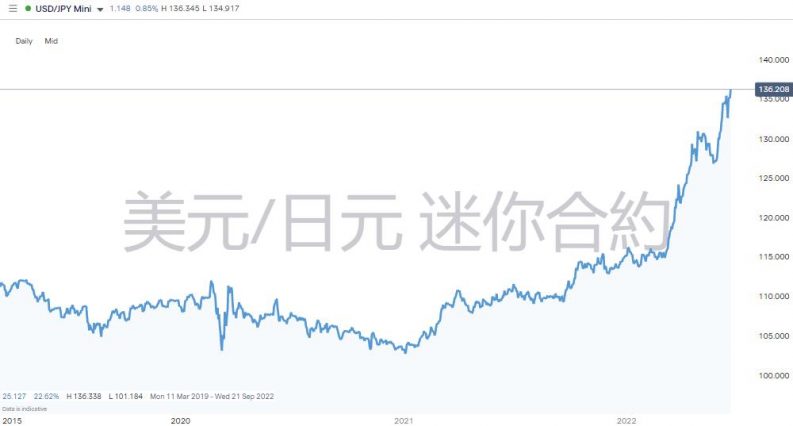
Source: IG
A recession can also be short-term and localised rather than global in nature. This may be due to a short-term political event such as the Brexit referendum, which was a surprise result that shocked the investment community. It resulted in a short-term contraction in confidence and economic production levels and resulted in the pound plummeting in value.
GBPUSD – Weekly Price Chart – 2010 – 2022
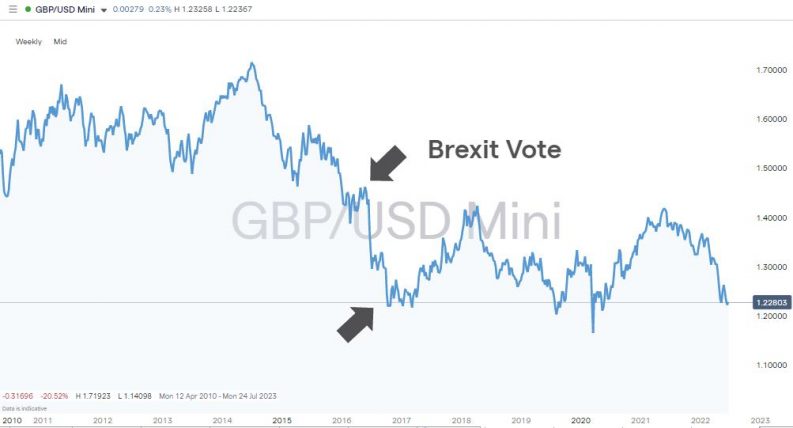
Source: IG
Recessions are something that forex traders need to approach with their eyes wide open. Preparing for one using fundamental and technical analysis can result in the successful trading of short and long-term currency price moves.
Currencies That Perform Badly During A Recession
Successful forex trading during a recession starts with carrying out research and monitoring key data points such as interest rates.
An economy that is contracting can expect to receive support from its central bank and government. One of the most effective and fast-acting policy tools is interest rates, and most central banks adjust these at regular meetings – typically taking place about once a month.
Reducing interest rates can help stimulate an economy thanks to borrowing being cheaper. Consumers and corporations both benefit from the added cash flow, and a virtuous circle of additional spending and production can kick-start the next period of growth.
The lower interest rates will also result in returns to savers being reduced. If another economy is, at the same time, not experiencing a recession, or at least out-performing its peer group, then interest rates in that country can be expected to remain at higher levels. Selling one currency and buying another allows savers to switch to a currency that offers higher returns and that impacts the price of the respective currencies.
Devaluing a currency through interest rate policy can also boost a failing economy’s exports. Its products become comparatively cheaper on the international markets, which represents another way that it can begin to recover. For this reason, central banks see cutting interest rates as a two-pronged approach to moving an economy out of a recession. As a result, even the threat of a recession results in interest rate projections being downgraded and dramatic moves in currency prices.
Currencies That Perform Well During A Recession
The currencies of countries with stronger economies can be expected to strengthen during a global recession. Interest rates can be expected to remain at higher levels due to the central bank being as concerned about the risk of inflation as it is about a possible slowdown in growth.
Currencies, Recessions And The Fear Factor
It is important to consider the ‘fear factor’ as well as economic fundamentals. During a global recession, demand for the US dollar and Swiss franc can be expected to increase due to their position as safe-haven assets. This is because if a protracted recession results in a meltdown of the global financial system and banks are at risk of defaulting, you’re best off holding the currency that is least likely to get caught up in a run on the bank.
A slump in sentiment caused by a recession can also lead to big corporations scaling back on expansion plans. If US-based multinationals scale back on ambitious overseas projects, then that will impact currency prices. As investment in emerging markets falls, so will the demand for the currencies of those countries, as there is no longer a need for the developing country’s currency to be bought.
Forex Markets and Localised and Global Recessions
Currency price moves can be very different in nature depending on the type of recession being experienced. During a global recession, there can be a feeling that one currency is the best of a bad bunch or that one is particularly weak. There will be currency moves, but they are more likely to be less extreme than if one economy is experiencing a localised recession.
During 2000–2002 the Argentine peso (ARP) came under extreme pressure due to it having been unrealistically pegged to the US dollar, which led to a banking crisis. In that instance, a run on the peso resulted in it falling in value from parity with the USD in October 2001 – to 3.51 pesos to the dollar one year later. With the rest of the global economy at that time being relatively stable, the eyes of international speculators were focused on the USDARP currency pair and excessive money flows drove the price down.
How To Trade Forex During A Recession?
Forex trading during a recession can be as much about how you trade as much as what you trade. There are a number of forex strategies that can help you but we have highlighted some rough guidelines to follow to optimise returns.
Investment Timelines
Having a clear strategy is always a good idea, but it becomes crucial when running forex trading strategies through a recession. Investment timelines need to be carefully considered because some recessions can last for years. Alternatively, day traders can hope to profit from excessive intraday price moves.
That makes it important to ‘run your winners’ and stay in profitable trades. Not every trade will make a profit and successful trading relies on cutting the loss-making ones early enough and maximising returns on profit-making ones.
Sell Short & Buy Long
Each forex trade is made up of two elements. The process involves simultaneously buying one currency and selling another.
Choosing the right currency pair can result in gains being maximised as you win on both legs of the trade. During the first half of 2022, those with the view that the European Central Bank was unlikely to increase interest rates could sell short EUR. Good brokers offer various EUR-based currency pairs, with IG offering EURUSD, EURGBP, EURJPY, EURCHF and EURCAD.
EURUSD – Daily Price Chart – 2021 – 2022
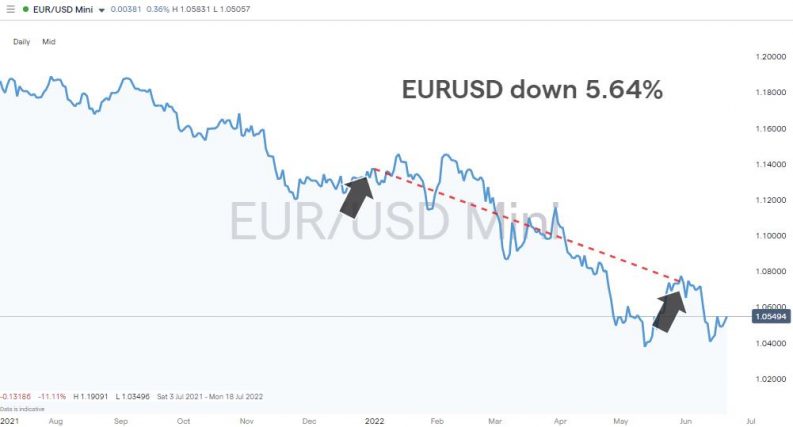
Source: IG
The obvious choice in terms of practicalities is to trade EURUSD as it’s the most widely-traded currency pair in the world and trading spreads are tight. However, there could be an alternative currency pair to offer better returns.
Notably, between 1st June and 31st May 2022, the price of EURUSD moved by 5.64%, but over the same time period, EURCAD recorded a 6.60% price change. This is due to CAD being regarded as a better bet than both the euro and US dollar.
EURCAD – Daily Price Chart – 2021 – 2022
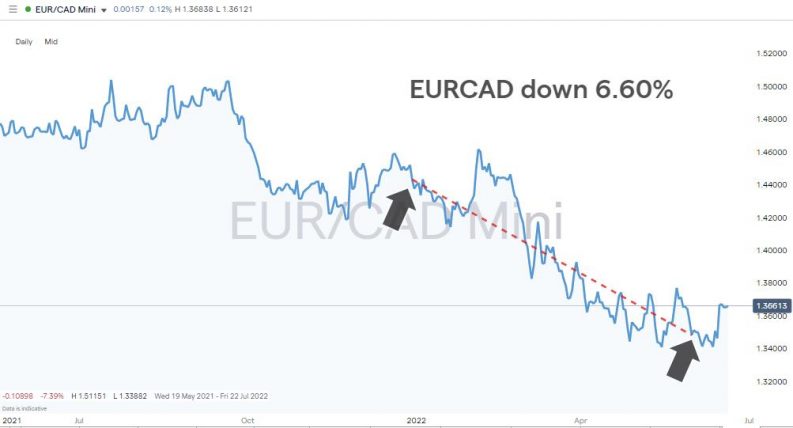
Source: IG
Manage Risk
Price volatility can be expected to increase during a recession. ‘Spooked’ investors can make erratic decisions and uncertainty about how effective policy measures might be results in investors taking very different views on where prices should be.
Forex trading during a recession can therefore benefit from scaling back on position size and leverage. That results in price swings, which can be greater in percentage point terms, smaller in cash terms. Smoothing out returns and building capacity to remain in positions is all part of being a sensible investor and making consistent long-term returns.
Signals To Look For
Forex trends can last for months and years but don’t expect every trade to be a winner from day one. Averaging into positions using a VWAP strategy allows you to gradually average into a position rather than go all-in and risk being thrown out of the trade before it really gets going. Using range trading strategies can help you enter into trades when a currency pair reaches the edge of its natural short-term price range.
Final Thoughts
Trading forex during a recession involves factoring in some unique features associated with an economic slowdown. The first step is to establish whether any recession is localised or part of a global trend as that will offer a clue as to the nature of subsequent price moves. Then it’s a case of waiting for the expected changes in the price of a currency pair to adjust to reflect the situation in the underlying economies.
The core principles of forex trading remain the same, but as picking the best currency pair for your strategy is important, there is some benefit in making sure you choose a broker that offers a lot of markets to trade. This shortlist of trusted brokers includes companies that have been reviewed by the AskTraders team, who have checked they are safe and offer a range of forex markets to help traders make the most of trading opportunities. Whether you’re new to trading or an experienced investor, they offer an ideal route into trading forex during a recession.




